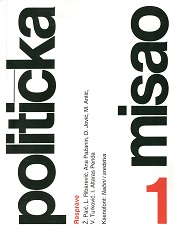Carnal Enlightenment: The Myth of Enlightened Reason and Two Carnal Conceptions of the State
Carnal Enlightenment: The Myth of Enlightened Reason and Two Carnal Conceptions of the State
Author(s): Hrvoje CvijanovićSubject(s): Politics / Political Sciences
Published by: Fakultet političkih znanosti u Zagrebu
Keywords: Enlightenment; state; carnal; Adorno and Horkheimer; Carl Schmitt
Summary/Abstract: The state in the modern sense ought to appear as the instrument of Reason able to control the passions. This is the modern myth of the state which has been fortified through the age of Enlightenment. However, the concept of ‘enlightened reason’ that lies behind the idea of the state is just a myth and thus is false. Rather, the modern state becomes the highest embodiment of ‘carnal reason’. As such, carnal reason manifests itself through the idea of self-preservation or life-preserving in general which feeds on human desire for domination over nature and over human beings themselves. Thus, the modern state provides the framework for the carnal discharge of sadistic passions in the name of the myth of ‘enlightened reason’. The argument is that the Enlightenment deceptively presented its goals as the cravings of Reason while deliberately concealing its carnal foundations. Namely, I differentiate between the sado-masochistic core of the Enlightenment and its rhetorical or intellectual mask. The life-preserving drive that inevitably transmutes into comprehensive destruction of the self, as well as destruction of the others and of the entire environment, is upheld through the legal framework of the state. I argue that it is this carnal reason that provides the foundation for the modern state, as opposed to the historically propagated ideal of ‘enlightened reason’. However, if the state represents the ultimate embodiment of ‘carnal reason’, there are at least two possible responses to that condition. The first response recognizes ‘carnal reason’ as an obstacle for the fulfilment of the Enlightenment’s ideals or as a betrayal of the idea of the state. This is the criticism developed by Horkheimer and Adorno in their diatribe on the Enlightenment and on the state, both of which are described as totalitarian and life-denying. On the other hand, the carnal conception of the state, separated from the burden of moral argument, is defended by Carl Schmitt as the fact of the political. Two carnal conceptions of the state represent two different articulations which should be juxtaposed and illuminated.
Journal: Politička Misao
- Issue Year: XLVIII/2011
- Issue No: 01
- Page Range: 76-93
- Page Count: 18
- Language: English

